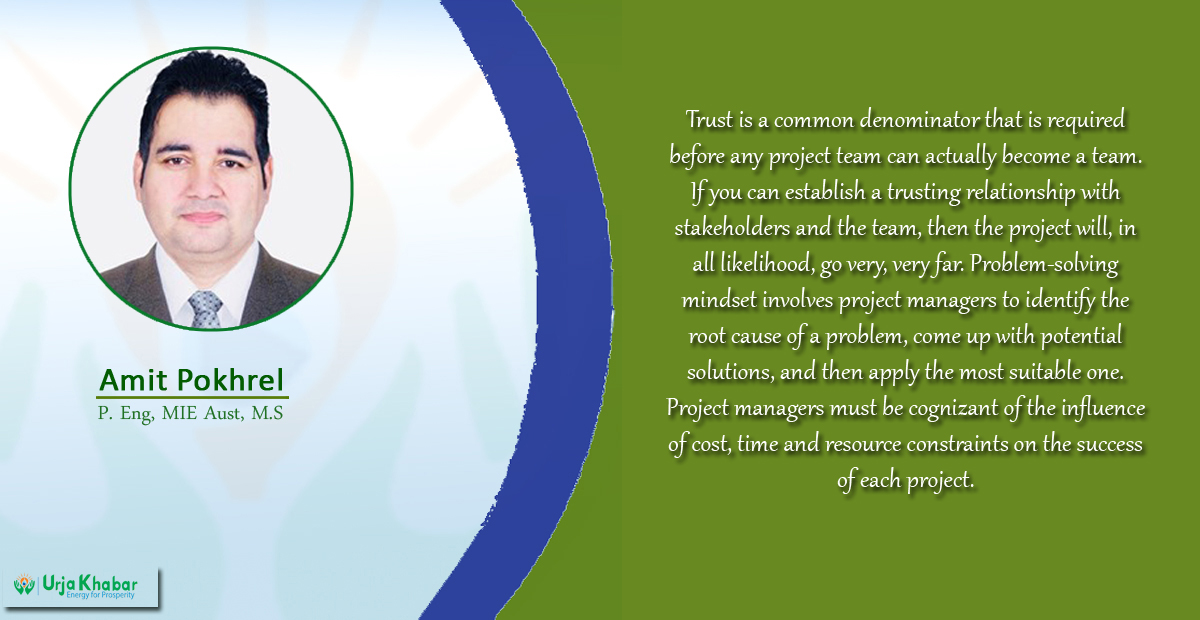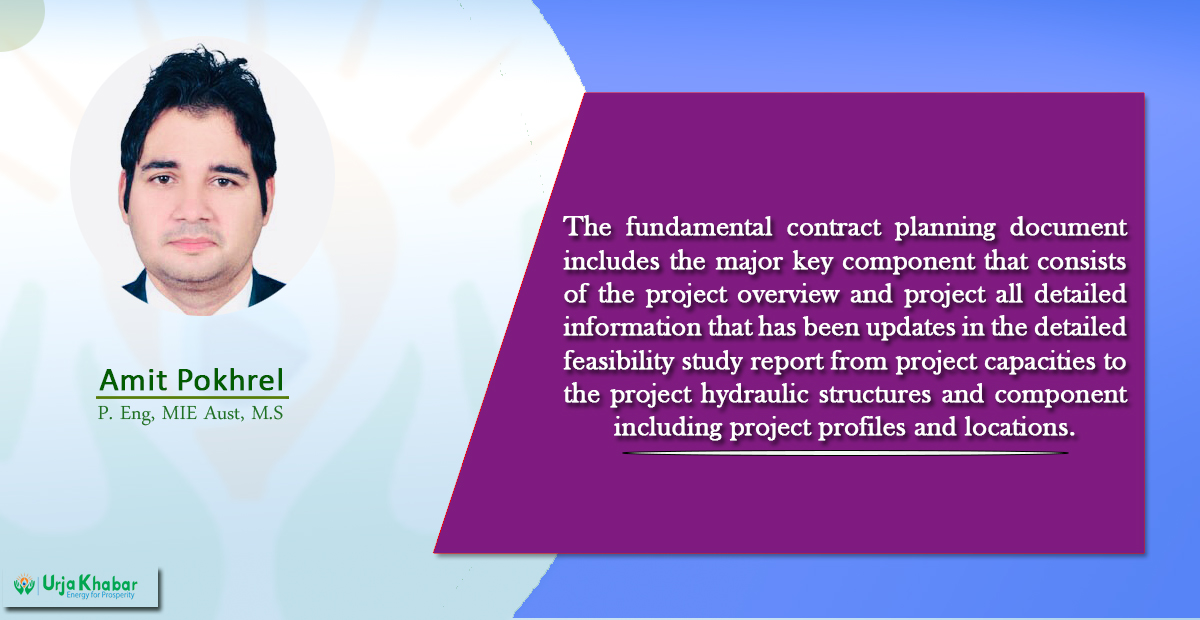Energy Update
Project Manager Leadership Skills in Developing Hydropower in Nepal

The future lies in clean energy solutions, such as hydropower. Technological and business innovations that progress the field necessitate new, innovative leaders. Intangible leadership skills encompass personality traits, interpersonal abilities, and attitudes developed from life experiences. These are not as easily measurable, taught, and acquired as technical skills.
This article will discuss the skills that are beneficial for those leaders who govern the highest leadership role in sites-based projects. Hydropower has a vital role to play in maintaining the stability and reliability of future energy grids as the global energy system begins to decarbonize. As the primary source of renewable energy with the greatest scope for deployment, hydropower is essential for the transition to renewable energy sources and the achievement of climate objectives.

This article provides an overview of the four categories of leadership skills that are essential for successful project managers in the hydropower development industry. Each category is characterized by its expertise, competencies, traits, and mindset. Examples of each category will be discussed to illustrate the benefits of each type of leadership. Proficiencies refer to the ability to effectively utilize knowledge in a particular field. There are a variety of proficiencies that are necessary for successful project management, such as research, analysis, negotiating, and report writing. Research skills enable project managers to quickly and accurately identify and interpret information within or outside the organization. Analysis skills allow project managers to analyze and make decisions based on the information they have acquired.
Project managers must possess competencies to effectively negotiate with multiple parties with varying perspectives. These competencies include the ability to write reports that are tailored to a particular audience and organized and accessible. Additionally, project managers must possess written and oral communication skills, as well as time management and decision-making skills. Communication skills are essential for most modern professional roles, but project managers must be proficient in both written and verbal communication to effectively communicate with and between two different stakeholders. Finally, project managers must have time management skills.

Project managers are primarily responsible for project planning and time management. They must have the ability to accurately forecast the duration of a task, remain on task, and assist their team in managing their time. Project managers need to be comfortable communicating in public, leading meetings, and delivering presentations. Project managers should possess research and analysis abilities, enabling them to make informed decisions by recognizing and evaluating alternatives. Additionally, project managers must be able to build strong relationships with stakeholders, based on trust and communication, as well as respect and inclusion. Project managers can develop and improve certain traits, such as self-motivation, creativity, attention to detail, and the ability to switch tasks. With motivation, project managers can more effectively persuade and motivate their teams. Additionally, they can lead their team and themselves through the various stages of project development, and remain motivated to remain on task.
Project managers may be presented with challenges that require them to come up with novel and unconventional solutions. To become more creative, it is important to be inquisitive, explore new avenues, and keep an open mind. Projects are composed of numerous, intricate components that must be monitored without losing sight of them. Spreadsheets, project monitoring software, and comprehensive plans can assist a project manager in recognizing, managing, and tracking a project's numerous details.
To facilitate task-switching, project managers must be able to quickly and effectively transition between tasks. Project managers must juggle a variety of tasks at the same time, and must frequently and rapidly switch between projects. This necessitates the need to switch tasks without taking the time to reorient oneself between the tasks assigned to them. Mindsets are a type of mental attitude that governs how project managers conduct their work. Key mindsets necessary for project managers include leadership, goal-oriented thinking, critical reasoning, collaborative and problem-oriented thinking. It is important to remember that project managers are leaders and are responsible for the development and success of team members. Setting achievable, measurable objectives is a key factor in setting the tone for success for project managers and their teams.
Problem-solving mindset involves project managers identifying the root cause of a problem, coming up with potential solutions, and then applying the most suitable one. Project managers must be cognizant of the influence of cost, time, and resource constraints on the success of each project. This knowledge is then used to carry out the essential project planning process, which involves defining the scope and objectives of the project, creating strategies to direct the team, and determining how to deliver the project results within the budgeted costs, time, and resources.
The primary responsibility of a project manager lies in the execution of the project. To ensure successful project execution, project managers must be capable of conducting risk assessments and taking the necessary steps to reduce the risks identified. This may include liaising with compliance to gain insight into potential legal or regulatory risks. Additionally, project managers should be able to monitor project progress, identify any potential obstacles, and report any issues to the appropriate stakeholders. Finally, project managers must ensure that the teams are adhering to the relevant business procedures and policies, including Standard Operating Procedures (SOPs) and Compliance Control Processes. Finally, successful project execution will require project managers to be familiar with the standard business administration procedures.
Project managers should possess an in-depth understanding of business requirements and the identification of solutions to business issues, the development of project budgets and the monitoring of project expenditure, and the establishment, monitoring, and reporting of key performance indicators to guarantee that projects are adhered to within the agreed-upon budgets for cost, time and resources. As project managers are primarily involved in the planning and execution of projects, they must also possess a thorough understanding of resource planning, the improvement of business processes, and the management of changes. Project managers are often responsible for allocating tasks to team members based on capacity and skill sets and maximizing team efficiency by managing utilization rates and monitoring progress. They may also need to identify, analyze, and improve existing business processes, particularly processes that teams can reuse between many projects. At times, project managers may also need to implement strategies that effect change and help teams adapt to changes, such as the transformation of an organization’s goals, processes, or technologies.
Project management methodologies and processes such as project lifecycles and executing project planning processes. Business administration and management such as budgeting and KPIs. To be successful as a project manager, you need several different skills. It's not just about knowing who is who in the company within the cross-functional teams. That is great to know. You also need to know a little bit about the product or service that you are implementing or trying to complete for the overall project. You should also have negotiation skills. Sometimes you're going to need resources at certain hours, and it might not work for you because they're working on another project. You need to be able to persuade to get that person to work additional hours with your project versus another one because it's more important.
The better you communicate, the more successful your potential is to become a project manager. Everyone is different. A good project manager must lead situationally. They analyze the audience, they analyze the stakeholders, and they adjust their leadership style to go ahead and meet the needs and, hopefully, meet the needs to motivate and commit to the individuals that you are leading. build trust. Trust is a common denominator that is required before any project team can become a team. If you can establish a trusting relationship with stakeholders and the team, then the project will, in all likelihood, go very, very far.
Leadership skills when managing a project, list leadership skills that are crucial to project management, and interpersonal skills and leadership are invaluable skills for project managers. Project managers are not only managers but leaders of their teams. In addition to managing many aspects of a project, they are also responsible for leading a group of different team members and stakeholders, often with varying backgrounds, experiences, and opinions. Project leadership brings together team members to work towards a common goal. There is no rule book or set steps to becoming a leader, and many personality types can effectively lead a team.
Leadership and management are similar skills with plenty of overlap, but they also have distinctions. Management involves methodically planning, organizing, and coordinating tasks and resources. This could include budgeting, creating schedules, and working with outside contractors. On the other hand, leadership involves motivating and encouraging others. Leadership is not about controlling team members but more about enabling them to do their best. Project managers must be both managers and leaders. They need to not only manage details but also often need to inspire a team and communicate a guiding vision for everyone to work towards. Being a leader involves a wide range of interpersonal skills.
These skills include communication, team building, motivation, trust building, and conflict management. Communication not only includes the ability to speak and persuade but also the ability to ask the right questions and listen. Project managers should also be able to facilitate effective communication between individual team members and groups such as different departments in an organization. Project managers should be able to build teams across the organization. Because project teams often involve people from across departments, project managers must bring these people together to achieve a common goal even if they have different interests in the project.
Project managers can use their knowledge of a team’s skills, personality traits, and interests to not only form teams but also to foster team relationships. Project managers should be able to motivate the team and stakeholders. Project managers must be able to maintain morale, encourage team members to do their best, and keep them interested in their work on the project. Project managers must understand the needs and motivators of each team member and stakeholder on the project and use that knowledge to help the team meet the objectives of the project and be satisfied with the work they are accomplishing. Project managers should be able to build trust in the team.
Project managers should foster an environment of trust between the team members and stakeholders involved in a project. Trust is an important element of project success and can lead to more effective communication, increased productivity, and decreased risk. Project managers can build trust by following through on their commitments and creating an environment where team members feel comfortable discussing project blockers and giving honest feedback. Project managers should be able to manage conflict. Given the diversity of most project teams, conflict is often unavoidable. Project managers can avoid some conflict by clearly defining project objectives, roles, and responsibilities from the beginning of the project. When conflict does arise, they can use several conflict resolution strategies to mitigate the impact of the conflict. There are usually five steps to conflict resolution: acknowledgment, clarification, mediation, solution identification, and monitoring.
In addition to the managerial skills that help project managers work with budgets, resources, and schedules, leadership skills help project managers inspire a team to work towards a shared vision. Some of the interpersonal skills needed for leadership in project management include communication, team building, motivation, trust building, and conflict management. There is no single best way to utilize these skills, and project managers benefit from having a variety of styles that they can draw on to lead a project. Project managers have several responsibilities throughout the lifecycle of a project. A responsibility is something that the project manager is accountable for that is within their control.
Project managers are responsible for project planning, project execution, project monitoring and reporting, post-project evaluation, and project closing. Project managers fulfill these responsibilities by completing several tasks before, during, and after a project. Tasks are definable pieces of work that are assigned to or expected of the project manager. One of the primary responsibilities of a project manager is project planning, which begins as soon as the project is initiated. Project managers are responsible for making sure that project goals and deliverables have been determined and that there is a plan in place to meet those objectives. During the planning phase, project managers: Build a project overview or business case to define project objectives, and identify key performance indicators or success metrics for the project estimate the time and effort required to complete a project and create a project plan, or Gantt chart that clarifies the project plan and schedule Project managers develop a project budget.
They must create a financial plan that outlines the anticipated usage of project resources. This budget includes costs, profits, expenditures, and sources of funding. Project plans and budgets can be created for the entire project or they can be created for a small, definable portion of the project. Once a project plan is in place, the project manager is responsible for the execution of the project and making sure that team members deliver on project objectives. To do this, project managers must create, disperse, and maintain: An accountability matrix to help team members understand their roles and responsibilities as well as, resource and utilization plans that guide the management of project resources, and a risk assessment and issue management tracker to facilitate risk and issue management. During the project, project managers are also responsible for monitoring and reporting on the project’s development. They must monitor the project’s execution compared to time, cost, and resource plans created during the planning phase.
Communication is also a key responsibility of project managers, and they must ensure that stakeholders receive regular reports regarding the status of the project. The project manager must determine who needs to receive what specific information, when they will receive it, and what communication channels will be used. To facilitate monitoring, reporting, and communication, project managers may build project dashboards to monitor the status of projects, track risks and issues, and then communicate project status with all stakeholders. Project managers may also facilitate regular meetings with stakeholders, keeping detailed agendas and notes to discuss the status of the project. They also need to track resources and costs and may need to participate in a timesheet, invoice, or expense approval. These responsibilities require project managers to keep track of several details about team members and stakeholders, as well as the project itself.
Several project management, communication, and collaboration tools can assist project managers with these tasks and responsibilities. Finally, project managers are also responsible for the evaluation and closing of a project. They must be able to critically assess a project’s performance, whether the project met its defined goals and objectives, and how the team may improve the process in the future. After evaluating the project, they must ensure that all project deliverables and information are finalized, stored, and dispersed for future use. Project managers may review project deliverables and evaluate key performance indicators, or KPIs, which provide quantifiable measures of performance.
These indicators help project managers evaluate the efficiency and effectiveness of a project’s performance and delivery. Using this data, they can identify strengths and weaknesses in the project process and target areas for improvement. Project managers in Nepal often fail to take their responsibilities seriously. This can lead to delays in the project, as compliance issues are often the primary obstacle to completion. To ensure successful project management, it is essential to have a strong leadership role and to be able to address critical issues based on knowledge and experience. It is also important to be mindful of the Employer's document ownership, as this can be a source of risk for project managers. However, those who do not know how to respond to these comments are often overlooked, leading to a negative impact on development in Nepal.
The Author of this article works as a Senior Contract management and Project Expert in the Energy Business of Golyan Group and is a Professional member of Engineer’s Australia
Conversation
- Info. Dept. Reg. No. : 254/073/74
- Telephone : +977-1-5321303
- Email : [email protected]














